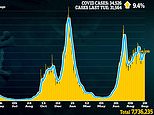Long Covid hits more than a THIRD of coronavirus sufferers, new study finds
Long Covid hits more than a THIRD of all coronavirus sufferers with at least one symptom, new study finds
Researchers studied more than 270,000 people in the United StatesLong Covid symptoms were diagnosed in 37% three to six months after infection Anxiety/depression was the most common of nine primary symptoms
<!–
<!–
<!–<!–
<!–
(function (src, d, tag){
var s = d.createElement(tag), prev = d.getElementsByTagName(tag)[0];
s.src = src;
prev.parentNode.insertBefore(s, prev);
}(“https://www.dailymail.co.uk/static/gunther/1.17.0/async_bundle–.js”, document, “script”));
<!–
DM.loadCSS(“https://www.dailymail.co.uk/static/gunther/gunther-2159/video_bundle–.css”);
<!–
A third of people infected with coronavirus will have at least one symptom of long Covid, a study suggests.
Researchers at the University of Oxford, the Oxford Health Biomedical Research Centre (BRC) and the National Institute for Health Research (NIHR) studied more than 270,000 people in the United States who were recovering from coronavirus.
Long Covid symptoms were diagnosed in 37% of patients three to six months following infection, The Guardian reports.
Anxiety/depression was the most common of nine primary symptoms, followed by abnormal breathing, abdominal symptoms, chest/throat pain and fatigue.
A person’s age, sex, and the severity of the infection played a part in the chance of developing long Covid symptoms, the data from the TriNetX health record network shows.
Researchers at the University of Oxford, the Oxford Health Biomedical Research Centre (BRC) and the National Institute for Health Research (NIHR) studied more than 270,000 people in the United States who were recovering from coronavirus (pictured: Royal Free Hospital, London)
Dr Max Taquet, NIHR academic clinical fellow, said: ‘The results confirm that a significant proportion of people, of all ages, can be affected by a range of symptoms and difficulties in the six months after Covid-19 infection.
‘Over one-third of patients were diagnosed with at least one of the long Covid symptoms between three and six months after their Covid-19 illness.’
Symptoms were slightly more common in women and those who had been in hospital.
Dr Taquet added: ‘These data complement findings from self-report surveys, and show that clinicians are diagnosing patients with these symptoms. We need appropriately configured services to deal with the current and future clinical need.’
The study comes as Britain’s daily Covid cases rose by 9.4 per cent in a week – but deaths and hospitalisations both fell by around a fifth, official statistics for Tuesday show.
Some 34,526 positive tests were recorded across the UK, up from 31,564 last Monday, according to the Department of Health data. It is the eleventh day in a row that infections have increased week-on-week.
Another 167 Covid deaths were recorded, down by 17.7 per cent compared to the 203 fatalities recorded one week earlier.
And hospitalisation data shows 706 infected people came forward for NHS care on Friday, a drop of 18 per cent drop on the 741 reported on September 17.
Both measures lag several weeks behind cases because of how long it can take for infected patients to become seriously ill.
The rising number of cases come amid fears Britain could be on the cusp of a fourth wave, with data suggesting that cases have started to spill over from children to their parents.
No10’s top scientists have always warned another wave of infections would strike this autumn following millions of pupils returning to classrooms.
Meanwhile, the Office for National Statistics (ONS) published data which showed the UK breached 1,000 in mid-September for the first time since March.
![]()


